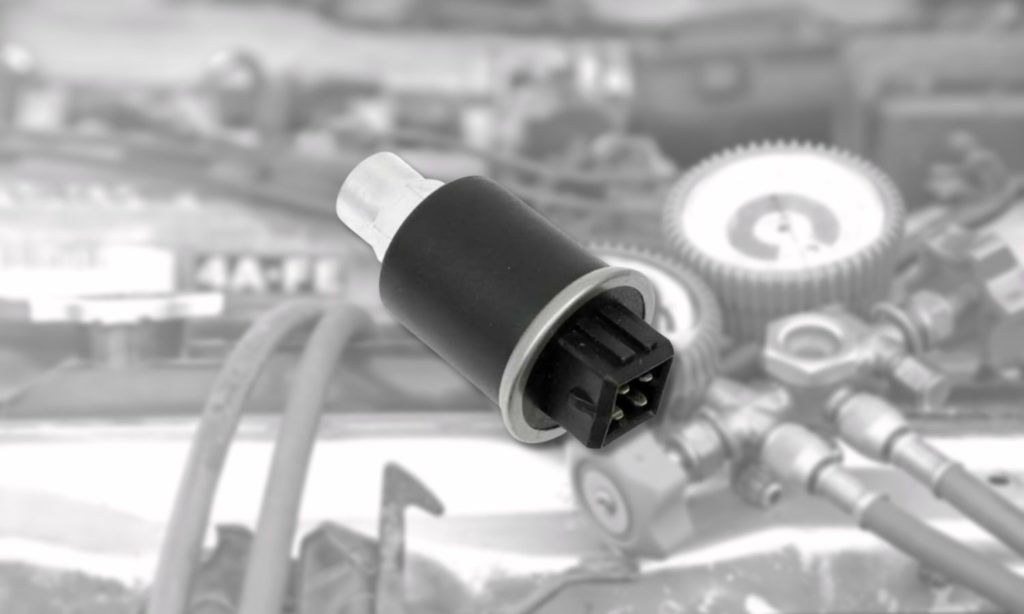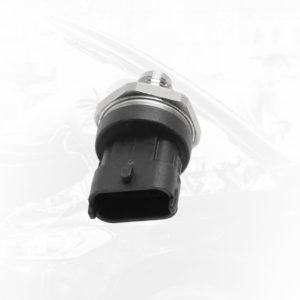The air conditioning (A/C) pressure sensor is a pressure transducer that converts refrigerant pressure into a voltage signal for the powertrain control module (PCM). The PCM will register a P0533 code on a scan tool if it detects a high voltage value within the A/C pressure sensor “A” circuit.
What Does the P0533 Code Mean?
Diagnostic trouble code P0533 stands for “A/C Refrigerant Pressure Sensor ‘A’ Circuit High.” This is a generic powertrain code that can apply to a variety of vehicles equipped with OBD-II.
Heating, ventilation, and air conditioning (HVAC) systems use multiple sensors to regulate the temperature inside a vehicle’s cabin. The A/C pressure sensor typically has three wires that lead to the control module, which can be the Electronic Climate Control (ECC), Body Control Module (BCM), or the powertrain control module (PCM).

The A/C pressure sensors contain a five-volt reference circuit, a signal circuit, and a ground circuit. The control module will calculate system pressure using signals from these circuits.
If the PCM detects a fault within the A/C pressure sensor “A” circuit, the vehicle’s computer will log a P0533 code on a scan tool.

Note: The definition of code P0533 might be different depending on the vehicle manufacturer. Consult the appropriate repair manual or repair database for the exact code definition.
What are the Common Causes of the P0533 Code?
- Faulty or damaged A/C refrigerant pressure sensor
- Leaking A/C refrigerant pressure sensor
- Low refrigerant pressures or refrigerant level
- Corroded or frayed wiring
- Faulty control module

What are the Common Symptoms of the P0533 Code?
- Illuminated check engine light
- HVAC doesn’t work properly
- A/C compressor doesn’t engage
How to Diagnose the P0533 Code
Not all vehicles have the same diagnostic steps. A P0533 code for a Dodge might be different from a P0533 code for a Honda. You’ll have to review your vehicle’s repair manual before attempting to diagnose this code because some terms and instructions might be different for your specific vehicle. You can use the following video as a reference to help you with your diagnosis.
However, if you don’t have any auto repair skills or knowledge, you should hire a mechanic to do this part for you. This can help you save time and effort on diagnosing this DTC while avoiding costly mistakes.
How to Fix the P0533 Code
If you want to clear a DTC P0533, you must identify its underlying causes to determine the right fix. There are technical service bulletins for certain problems associated with this code, which can help you fix your vehicle’s problems. You can also look for Chilton repair manuals to get a better view of your vehicle’s parts and potential problems. However, if you have some extra cash, we recommend getting an ALLDATA subscription because it contains vehicle-specific information.
Where to Get a New A/C Refrigerant Pressure Sensor to Resolve Trouble Code P0533
Nobody likes to sit in a car with an inoperable air conditioning unit, especially in extreme temperatures. Unfortunately, this is what often happens when your vehicle logs a P0533 diagnostic trouble code.
Don’t let a P0533 code keep you from enjoying your car rides. Here at CarParts.com, you can find a high-quality A/C refrigerant pressure sensor to restore your A/C’s operation and make your vehicle comfortable for you and your passengers.
Find the right A/C parts for your vehicle by entering its specifications into our vehicle selector. This will narrow down the catalog to compatible products for your ride. For a more personalized shopping experience, you can also use the search filters to shop according to your preferred brand, price range, quantity, and more.
Enjoy the best deals when you shop from us. All our products come with a low-price and lifetime replacement guarantee, helping you get the best value for your money.
Thanks to our fast shipping services and strategically located warehouses across the US, we can deliver your product straight to your doorstep in as fast as two business days.
Shop now!
Any information provided on this Website is for informational purposes only and is not intended to replace consultation with a professional mechanic. The accuracy and timeliness of the information may change from the time of publication.


















